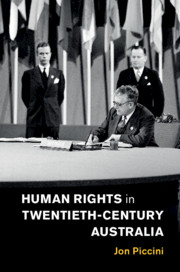Book contents
- Human Rights in Twentieth-Century Australia
- Human Rights in History
- Human Rights in Twentieth-Century Australia
- Copyright page
- Dedication
- Contents
- Acknowledgements
- Introduction: Bereft of Words
- 1 Inventing Rights
- 2 Cold War Rights
- 3 Experimental Rights
- 4 Whose Rights?
- 5 Implementing Rights
- Epilogue: Cascade or Trickle?
- Index
1 - Inventing Rights
Published online by Cambridge University Press: 20 September 2019
- Human Rights in Twentieth-Century Australia
- Human Rights in History
- Human Rights in Twentieth-Century Australia
- Copyright page
- Dedication
- Contents
- Acknowledgements
- Introduction: Bereft of Words
- 1 Inventing Rights
- 2 Cold War Rights
- 3 Experimental Rights
- 4 Whose Rights?
- 5 Implementing Rights
- Epilogue: Cascade or Trickle?
- Index
Summary
The 1940s are remembered as the birthplace of modern human rights, justifying wartime needs for regimentation and framing the utopian moment of the postwar years. The Catholic Church proved an early partisan of universal human rights in Australia, with the inauguration of the annual Catholic Social Justice Statement in 1940 dubbed a declaration of “fundamental human rights”. The statement and those that followed allowed the Church to eek out a place in the postwar world. At the same time, Australia's Labor Party sought a greater centralisation of state power to ensure that Australians could enjoy the "freedom from fear and want" the Atlantic Charter promised. The 1944 Powers Referendum saw the need for social and economic rights face off against personal liberties in a strenuous debate which informed Australia's approach to negotiating the Universal Declaration of Human Rights. Decade’s end saw Chinese and Malaysian seamen campaign alongside their white Australian wives for their “human rights”, only to find a less-than-receptive ear from a government and judiciary who, while supportive of the Universal Declaration in the abstract, wanted to protect domestic jurisdiction at all costs
Keywords
- Type
- Chapter
- Information
- Human Rights in Twentieth-Century Australia , pp. 21 - 52Publisher: Cambridge University PressPrint publication year: 2019



